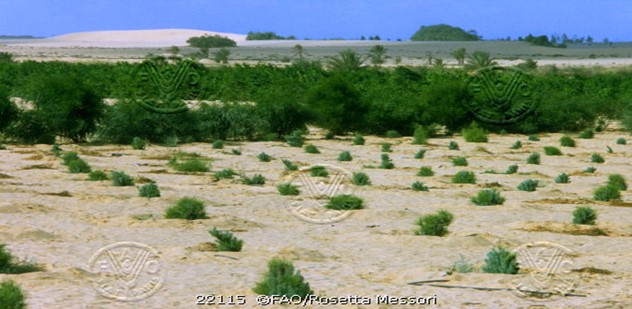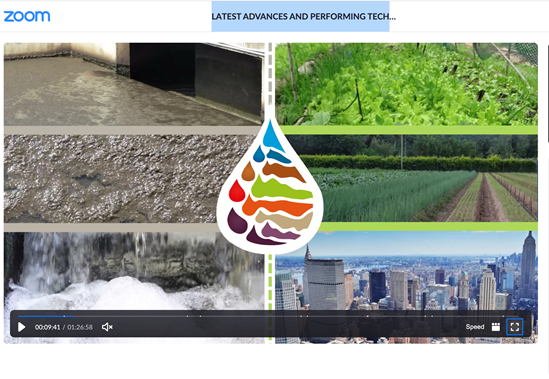Best Practices > Details
Maghreb- A Pole of Excellence for Unconventional Waters Utilization
26/11/2021 , Marrakech

Maghreb- A Pole of Excellence for Unconventional Waters Utilization
©@FAO
Why is it important for the Maghreb region to utilize the unconventional water resources for agriculture development?
While Maghreb countries are committed for the implementation of the SDGs, water remains a key factor of sustainable development for the region. The Maghreb countries are facing considerable water scarcity challenges
that will be exacerbated in the upcoming years due to increasing population, water demand and climate change impacts.
The non-conventional water resources have significant potential, particularly in the context of water scarcity and climate change,
and should be incorporated into the integrated water resources management in the Maghreb countries.
It should be noted that the Maghreb countries have an important need for the strengthening of the institutional, legislative and technical
aspects related to the planning, programming, management, financing, investment, implementation and operation of non-conventional water projects, in particular for the reuse of treated wastewater resources.
How is FAO helping?
The Near East and North Africa region have the lowest reserves of freshwater resources in the world. Water availability has been decreasing by two thirds over the last 40 years. Due to this growing water scarcity, changing climatic conditions,
and increasing water demands, the region is expected to experience economic losses estimated at 6 -14% of GDP by 2050. By that time, 60% more freshwater resources will be needed to satisfy the growing global demand for food.
In this context
and within the framework of the Regional Water Scarcity Initiative (WSI), FAO and its partners are continuing to support - more than ever before - countries in the region in addressing their most pressing challenges: assessing food and water security
for sustainable economic and social development. To prevent acute water shortages, the reuse of non-conventional water resources for agricultural production is emerging as a priority for most countries.
What about the specific support in the area of unconventional water resources utilization?
With the aim of discussing the way forward for using the untapped potential of wastewater and drainage water in the NENA region, FAO-SNE, IWMI-MENA, WHO, ICBA and IME organized a series of Webinars, in collaboration with many distinguished
scientists, leaders and influencers in the field of wastewater reuse (WWR).
The series of eight Webinars entitled “Unlocking the Potential of Treated Wastewater and Drainage Water for Agricultural Development” is based on the
same-titled project managed by FAO- SNE, which partners with IWMI’s ReWater MENA project. This series enabled hundreds of people from all around the world attend, share their ideas on the subject and gradually become more aware about the current
status of WWR in various countries in the region.
The main focus of this series was to tackle the use of wastewater for agricultural purposes since irrigation has, by far, the highest share of our precious fresh water, consuming over 80%
in the MENA region.

This series fulfilled the need of improved regional cooperation between countries in the field of non-conventional water reuse for agricultural development, and exchanging knowledge and information on the safe use of treated wastewater and drainage water in agriculture. It also focused on policy dialogue for strategies and initiatives, promoting non-conventional water reuse in the region. All the previously mentioned objectives help in turning the potential of non-conventional water resources into opportunities for sustainable agricultural development in the region.
How do you grantee ownership and full participation of the stakeholders in the region?
As mentioned, several hundreds of stakeholders have indeed attended the series and many have actively participated as well. The beneficiaries mainly consisted of national multidisciplinary teams, including policymakers and stakeholders from ministries of agriculture, water, environment and health. Attendees also included research institutes, development sectors, civil societies, and private sector entities all of which are involved and interested in the non-conventional water sector and the potential that it holds for arid and semi-arid countries in the MENA region.
Development webinar series has granted the opportunity for the various stakeholders to voice out their experience as well as lessons learned. It has also allowed experts in the field to discuss the challenges that they have been through while implementing treated wastewater reuse projects in their respective countries. FAO and IWMI will continue to seek more improved collaboration on achieving safer and more cost-effective solutions to water scarcity in the arid region. They are also determined to streamline irrigation and agricultural practices through the efficient usage of treated wastewater.
What about pollical commitment?
On March, the Arab Maghreb Union (UMA), in collaboration with the FAO office for North Africa, organized a high-level Maghreb political dialogue which presented the visions, strategic orientations and approaches adopted for the use of the potential of so-called unconventional water resources.

At the end of the High-Level Dialogue, a Joint Ministerial Declaration of Cooperation affirmed the adhesion of countries to the Maghreb Initiative for non-Conventional Waters (IMENCO) launched on March 22, 2021. This proposed Initiative by FAO and the UMA, will strengthen Maghreb cooperation through the establishment of a permanent technical committee specialized in the field of non-conventional water within the UMA. It will create a Maghreb Pole of Excellence for the reuse of unconventional water based on the development and interconnection of pilot sites of excellence across the UMA region.
A Maghreb Collaborative Platform to capitalize on the experiences of the last decades, and to promote the exchange of good practices and the sharing of knowledge and research results will be created as a mechanism of the Maghreb Pole of Excellence for unconventional waters
What are the next steps?
FAO and the Maghreb Arab Union (UMA) during 23 – 25 November are organizing a sub-regional workshop and the establishment of the Maghreb permanent technical committee for non-conventional water is in the agenda. On the other hand, for the other components of the FAO-UMA initiative for non-conventional waters, we have prepared a subregional project document (Subregional NCW Investment Plan) for fundraising and it is for supporting the implementation of all the mentioned components. The discussion of the logframe and action plan of this proposal is in the agenda of the mentioned workshop.
Find out more
- Maghreb Policy Dialogue on the Potential of Non-Conventional Water for Sustainable Agricultural Development in the Arab Maghreb Countries March 22, 2021 - World Water Day Ministerial Declaration
- Status of TWW and DW Reuse in the NENA Region
- Worldwide Successful Experiences for Treated Wastewater and Drainage Water Reuse for Agriculture Development
- Political, Institutional, and Managerial Framework for Non-Conventional Water Resource
- Latest Advances and Performing Technologies in Water Treatment and Storage
- Performing Agricultural Production with Non-Conventional Water Resources
- Cost Benefit Analysis for Treated Wastewater and Drainage Water Reuse Projects for Agricultural Development
- Policy Dialogue-Dialogue Politique Maghrébin
- The Regional Perspective: Toward Innovative Approach to Unlocking the Potential for non-Conventional Water Resources
